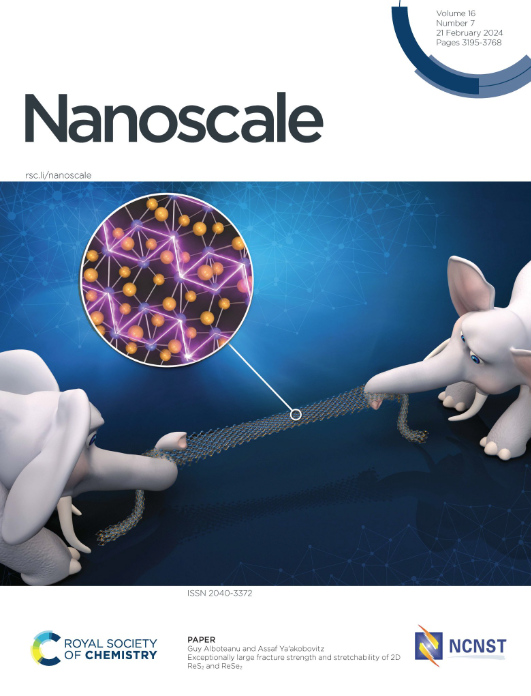Oxacillin promotes membrane vesicle secretion from Staphylococcus aureus via an SarA–Sle1 regulatory cascade
IF 5.8
3区 材料科学
Q1 CHEMISTRY, MULTIDISCIPLINARY
引用次数: 0
Abstract
Membrane vesicles (MVs) are nanoscale particles secreted by living bacteria in vitro and in vivo. Bacterial MVs encapsulate various proteins, making them promising candidates for developing vaccines, drug carriers, and cancer immunotherapy agents. However, the mechanisms underlying MV secretion from Gram-positive bacteria remain unclear. Here, we showed that the subinhibitory concentration of oxacillin (OXA) stimulated MV production in Staphylococcus aureus with diverse genetic backgrounds. OXA treatment remarkably increased the expression of sle1, which encodes a main peptidoglycan hydrolase for adjusting peptidoglycan cross-linking. Deletion of sle1 decreased the OXA-mediated MV yield, whereas overexpression of sle1 considerably increased MV production. The accessory regulator SarA increased in response to OXA treatment, and SarA inactivation substantially attenuated OXA-stimulated MV production. We also demonstrated that SarA controlled sle1 expression by directly binding to its promoter region. Thus, the SarA–Sle1 regulatory axis was formed to mediate OXA-induced MV production in S. aureus. MVs derived from OXA-treated S. aureus RN4220 (MVs/OXA) exhibited a smaller particle size compared with those purified from wild-type RN4220; however, proteomic analysis revealed a comparable protein profile between MVs and MVs/OXA. Overall, our research reveals a mechanism underlying OXA-promoted S. aureus MV secretion and highlights the potential application of OXA-induced MVs.氧青霉素通过 SarA-Sle1 调控级联促进金黄色葡萄球菌分泌膜囊泡
膜囊泡 (MV) 是活细菌在体外和体内分泌的纳米级颗粒。细菌膜囊泡能包裹各种蛋白质,因此很有希望成为开发疫苗、药物载体和癌症免疫疗法制剂的候选物质。然而,革兰氏阳性细菌分泌中空微粒的机制仍不清楚。在这里,我们发现亚抑制浓度的奥沙西林(OXA)能刺激具有不同遗传背景的金黄色葡萄球菌分泌中空球蛋白。OXA处理显著增加了sle1的表达,而sle1编码一种调节肽聚糖交联的主要肽聚糖水解酶。缺失 sle1 会降低 OXA 介导的 MV 产量,而过表达 sle1 则会大大增加 MV 产量。附属调节因子 SarA 在 OXA 处理后增加,SarA 失活大大减少了 OXA 刺激的 MV 产量。我们还证明,SarA 通过直接结合到 sle1 的启动子区域来控制 sle1 的表达。因此,SarA-Sle1调节轴的形成介导了金黄色葡萄球菌中OXA诱导的MV产生。从经 OXA 处理的金黄色葡萄球菌 RN4220(MVs/OXA)中提取的 MV 与从野生型 RN4220 中纯化的 MV 相比,粒径更小;然而,蛋白质组分析表明,MVs 和 MVs/OXA 的蛋白质谱具有可比性。总之,我们的研究揭示了 OXA 促进金黄色葡萄球菌 MV 分泌的机制,并强调了 OXA 诱导的 MV 的潜在应用价值。
本文章由计算机程序翻译,如有差异,请以英文原文为准。
求助全文
约1分钟内获得全文
求助全文
来源期刊

Nanoscale
CHEMISTRY, MULTIDISCIPLINARY-NANOSCIENCE & NANOTECHNOLOGY
CiteScore
12.10
自引率
3.00%
发文量
1628
审稿时长
1.6 months
期刊介绍:
Nanoscale is a high-impact international journal, publishing high-quality research across nanoscience and nanotechnology. Nanoscale publishes a full mix of research articles on experimental and theoretical work, including reviews, communications, and full papers.Highly interdisciplinary, this journal appeals to scientists, researchers and professionals interested in nanoscience and nanotechnology, quantum materials and quantum technology, including the areas of physics, chemistry, biology, medicine, materials, energy/environment, information technology, detection science, healthcare and drug discovery, and electronics.
 求助内容:
求助内容: 应助结果提醒方式:
应助结果提醒方式:


